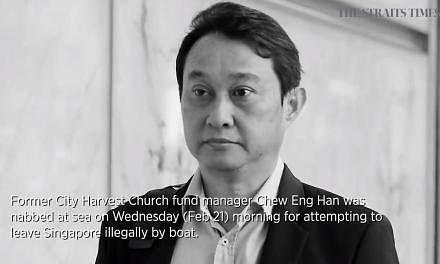SINGAPORE- The Attorney-General's Chambers (AGC) will work with the relevant ministries on the "appropriate revisions to the Penal Code".
This follows the decision by a five-judge Court of Appeal on Thursday (Feb 1) to dismiss prosecutors' bid to reinstate the original convictions for City Harvest Church (CHC) founder Kong Hee and five others.
In a statement responding to the court's decision, the AGC said this was to ensure that company directors and other persons in similar positions of trust and responsibility are subject to appropriate punishments if they commit criminal breach of trust (CBT).
The court's decision had made clear that Section 409 of the Penal Code only applies to professional agents, overruling a 1976 High Court decision which held that company directors could be convicted of CBT under the same law.
After a marathon 142-day trial that started in 2013, the six were convicted of CBT as agents, under Section 409 of the Penal Code. They were handed jail terms ranging from 21 months to eight years in November 2015.
They appealed against their convictions and sentences, while the prosecution appealed for harsher sentences.
Deciding on the appeals last April, the High Court, in a split 2-1 decision, cleared the six of CBT as agents and found them guilty of plain CBT under Section 406.
Two of the three judges on the panel ruled that Section 409 applies only to "professional agents"; and directors such as the six from CHC cannot be considered "agents" under Section 409. This resulted in their sentences being reduced.
"The Court of Appeal has now ruled that company directors, as well as governing board members or key officers of charities and officers of societies, who commit criminal breach of trust of company property are only liable to be punished under Section 406 of the Penal Code (Criminal Breach of Trust simpliciter), which provides for a maximum sentence of seven years' imprisonment," said the AGC in the statement.
"In contrast, employees of a company who commit criminal breach of trust are liable for up to 15 years' imprisonment," added the AGC.
In pronouncing its judgment, the Court of Appeal stated that a "wide-ranging policy review" of the legislative provisions on criminal breach of trust was "essential" and "long overdue", and that this was a matter for Parliament.
On Thursday morning, Judge of Appeal Andrew Phang, in reading the decision, had also said that if there is any gap in the law, the shaping of the remedy should be left to Parliament.
"A hard case should not be allowed to make bad law," he said, noting that the accused are still serving substantial jail terms.











